SEO Consultancy
SEO Auditing Services
Professional website audits with clear actionable recommendations.
Actionable SEO Audits That Solve Ranking Issues
SEO audits are used to identify issues with your website that may be responsible for a loss of ranking or inability to rank for keywords of importance. SEO audits are typically a mix of research, insights and actionable recommendations that are bespoke to each website.
We provide a dedicated, bespoke SEO audit service that helps to identify issues whilst providing clear, actionable recommendations for resolution followed by SEO consultancy to help support traffic recovery and/or growth.
Our SEO audits can be used for:
- Troubleshooting a lack of ranking growth
- Identifying issues as a result of ranking losses after search engine updates i.e Google Core Updates
- Identifying CMS migration SEO issues
- Identifying domain migration issues
- Troubleshooting random traffic/ranking losses
- Troubleshooting and resolving Google penalties/manual actions
- Ensuring full technical compliance and adherence to best practices

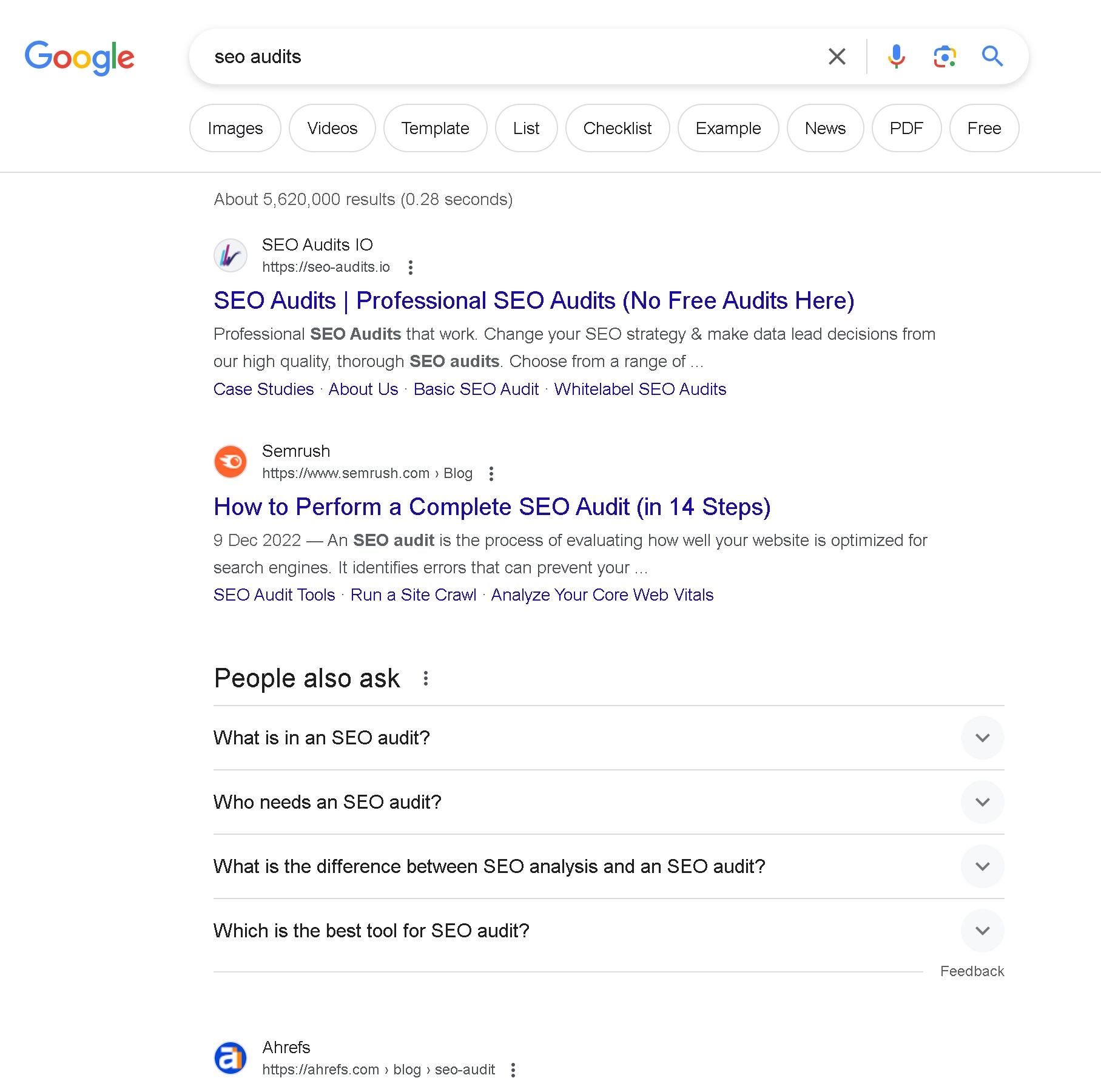
What can our SEO Audits be Used For?
Troubleshoot Ranking & Traffic Losses
Our SEO audits can be used to identify where clicks/rankings have been lost, why they may have been lost and a recovery strategy with recommendations covering tech, content, links, SEO testing & more. We can identify Google update related impact – looking at specific Google core updates and how they may have devalued/dropped your website content.
Troubleshoot Google Penalties/Manual Actions
If you’ve received a penalty be it algorithmic or a manual action in Google search console we can audit, provide recommendations as well as SEO consultancy to support you through clearing things up, filing reconsideration requests and more. We’ve helped lots of businesses to address penalties ranging from spam actions through to AI content penalties/deindexing and more.
Troubleshoot Migrations, Domain Changes, Tech Stack Changes
Our SEO auditing service can be used to troubleshoot CMS migrations, domain changes as well as changes in website tech stacks i.. headless CMS, JS/SPA applications and more. We can help audit and provide recommendations to recover from migration issues to domain changes/consolidation and more.
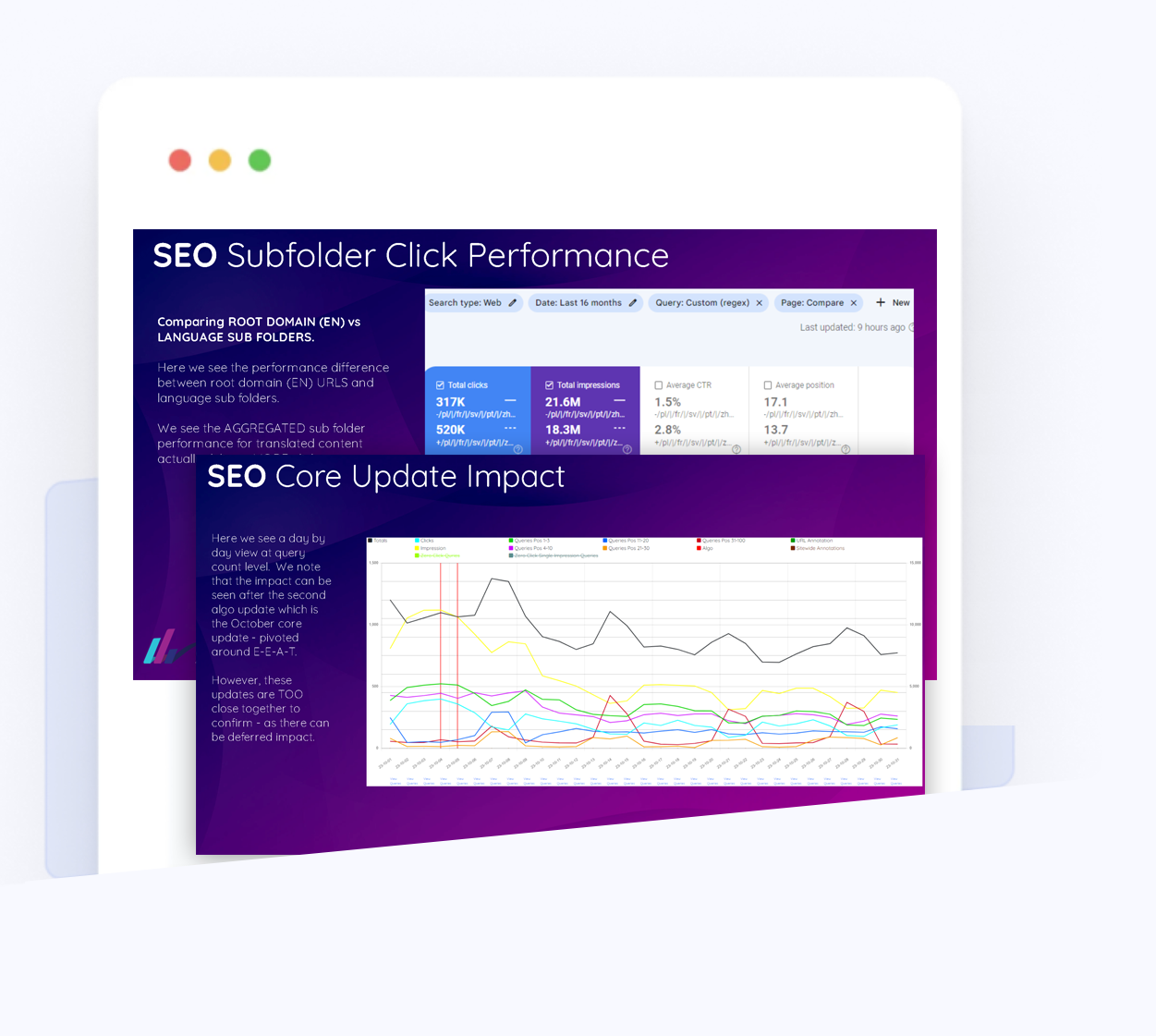
How much does an SEO Audit Cost?
SEO Auditing Pricing
SEO audit costs are dependent on the type of audit required & the size of site to be audited. Costs shown below are indicative.
SEO audits will typically cost:
- £1000 – £1500 (excl VAT) for small websites
- £2000 – £4000 (excl VAT) for medium-sized websites
- £5000 (excl VAT) + for larger complex sites
Specialist audit pricing:
- Ranking & Traffic Recovery Audits – Start at £3,499 (excl VAT)
- CMS Migration SEO Audits – Start at £3,499 (excl VAT)
- SEO Audits for Penalty Recovery – Start at £1,999 (excl VAT)
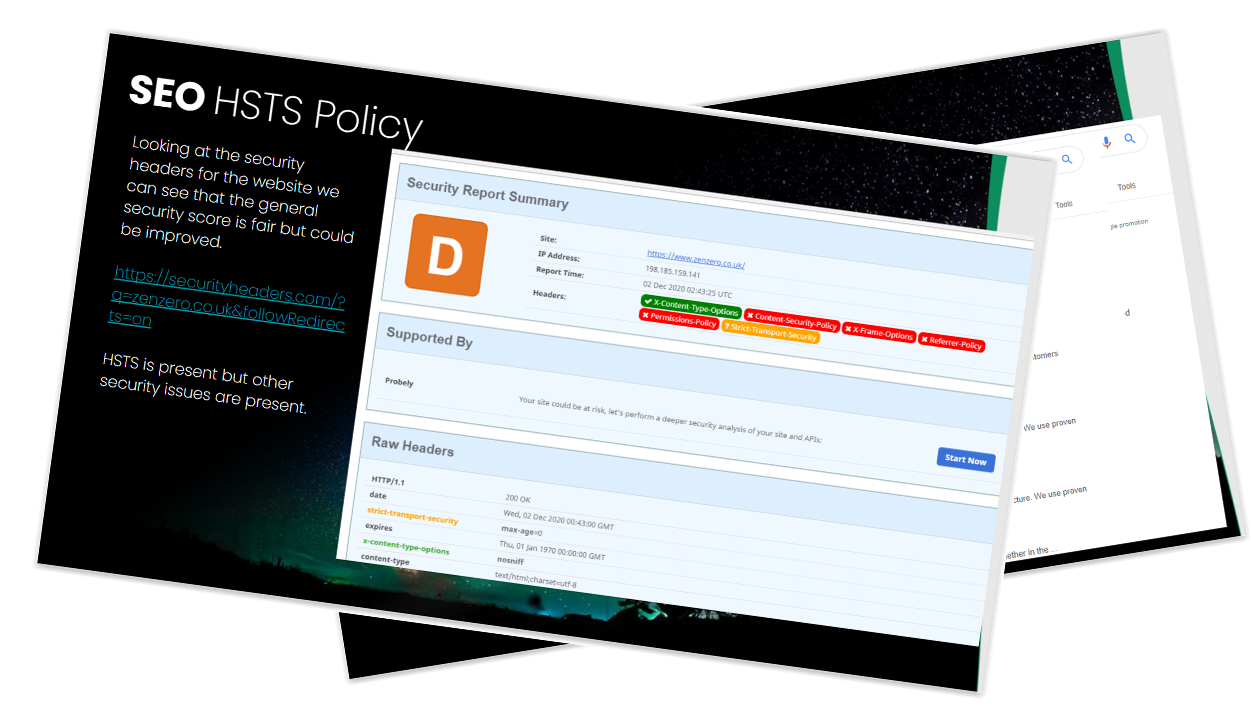
How long does an SEO Audit take?
Audit delivery is highly dependent on the size of website & type of audit booked. The AVERAGE delivery turn-around time is 30 days. We recommend you contact us & during the SEO consultation, we can advise on your audits delivery date.
Typical delivery times:
- Basic SEO Audits (smaller/medium size sites) – 14-28 days average
- Intermediate/Advanced SEO Audits (smaller/medium/larger sites) – 30 days average
- Behemoth SEO Audits – 30-42 days average
- Specialist SEO Audits i.e. Rank Recovery – 14-21 days average
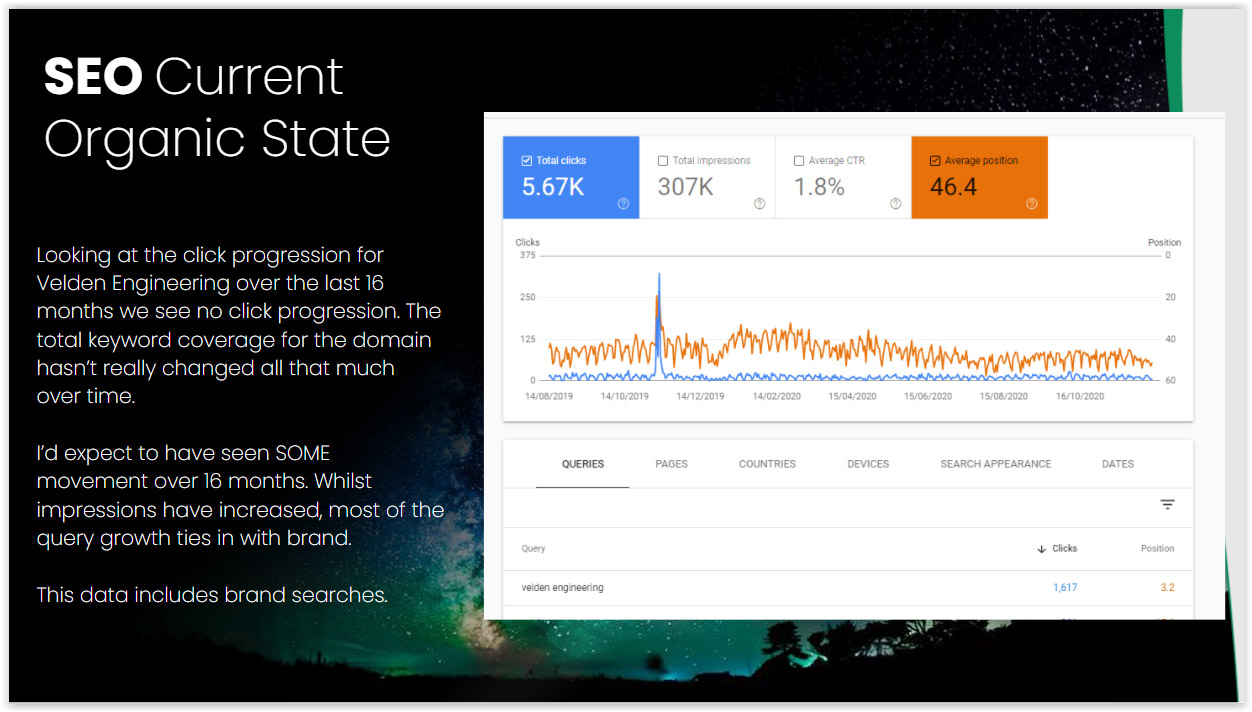
What does the SEO Audit include?
The SEO audit will include:
- A full position summary review of your website
- An overview of keyword performance
- Site crawl health check
- Page rendering health check including mobile friendly render checking
- Site index & URL coverage health check
- Navigation review
- Page cache and crawl budget review
- Technical checks including a code review, tag checks
- Tag checks including Google Analytics, Google Analytics 4, Google Tag Manager
- Blocked resources, elements and media files summary
- Website URL integrity checks (HTTP / HTTPS / WWW / NON WWW)
- Index bloat & weak content checks
- Duplicate content & copyscape checks
- Internal linking checks
- Cannibalisation and canonicalisation checks
- ROBOTS.txt file checks
- Page header tag and content affinity checks i.e. H1 TAGS, H2 TAGS ETC.
- Title and meta description checks
- Directive tag checks i.e. no index tag, canonical tag
- CTR evaluation
- Page indexability & browser resource accessibility
- Internal links and external links check
- Speed and performance checks using Think with Google / Pagespeed Insights
- Core Web Vitals report
- Best Practices Overview & Guide
- Development and coding feedback
Please note the list above is not exhaustive, there are generally a lot more checks involved including micro-checks.
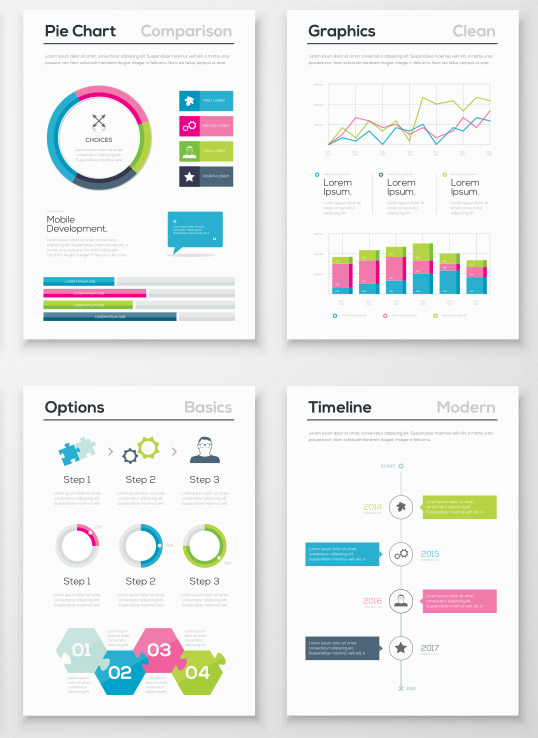
With my SEO Audit what will I receive?
Our audits are typically delivered as a set of Google Slides & accompanying Google Sheets. Your Google slides will be segmented so that RECOMMENDATIONS are on different colour slides so that it’s easy to navigate straight to actionable items.
Your audit may also come with:
- Spreadsheets of crawl data with actionable instructions
- Downloadable guidelines for developers
- Videos of highlighted issues and resolutions
All deliverables are provided over e-mail.
Can You Audit Any CMS?
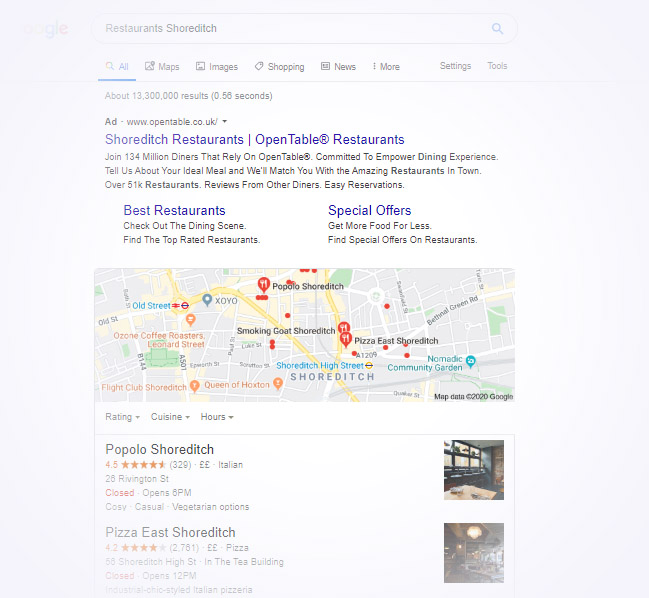
Yes, we can audit any CMS (content management system) including popular CMS’s such as:
- WordPress SEO Audits
- Magento SEO Audits
- Umbraco SEO Audits
- Shopify SEO Audits
- Squarespace SEO Audits
- Drupal SEO Audits
We can also audit custom tech stacks / technologies including but not limited to:
- Single Page Applications including Node JS / Angular
- Javascript Website SEO Audits
- REACT SEO Audits
- #c / Dot Net and PHP websites
- Flat file HTML websites
Can you provide implementation of SEO Audit Fixes/Recommendations?
Yes we can provide implementation for findings within your SEO audit. If you require technical SEO fixes and implementation we can help, we can also provide E-E-A-T/YMYL friendly content, digital PR and link acquisition if we find these present an issue for your website/domain. Implementation services are typically quoted for after audit delivery.
Do you offer pre-migration & post-migration website audits?
Yes we can provide audits for pre and post migrations. Typically an audit will be undertaken BEFORE changing CMS i.e. WordPress to Shopify, Magento to Shopify, Shopify to Woocommerce, Webflow, Drupal etc.
Audits will identify tech, content, indexing issues that may impede a migration. We provide recommendations before migrating. Once the migration is complete we provide a post migration audit to make sure your website is renderable, properly structured, indexable & more.
Can I get a free SEO audit?
We do not offer free audits. We offer a premium, bespoke auditing service based on over 2 decades of SEO experience – so unfortunately we do not provide free audits.
SEO Results Delivered For Clients
Daniel Foley has delivered substantial results for businesses across a whole variety of different business verticals/niches from finance and healthcare through to education, home improvement, manufacturing and more.
Daniel Foley helped SCI MX with an SEO strategy that saw traffic growth of over 140% for hundreds of keywords around protein powder, shakes and protein snacks as well as thousands of new long-tail blog keywords. SCI-MX’s traffic profile has continued to grow throughout 2020.
Working with iProspect, Daniel Foley worked on an SEO campaign for The Open University helping to deliver a technical SEO audit alongside SEO. The Open University had seen growth of over 30% organically. Technical SEO audits helped to alleviate ranking lag.
Daniel Foley worked with Holidaycottages.co.uk on an SEO strategy to increase rankings for keyword searches across the west country from holiday cottages to dorset cottages. Daniel Foley and the marketing team were able to deliver growth of over 75%.
Key SEO Audit Output & Analysis
Full Overview of Site Issues
A complete overview of all site issues with hollistic recommendations, priority recommendations and general SEO guidance.
Learn More
Find out everything to do with your websites build, structure and SEO composition. Fully manual audits conducted without SEO tools.
Understand Visitors & Clients
Understand how your potential clients / site visitors are using your website, where they bounce and what can be done to improve UX / engagement.
Learn More
A NAP audit ensures that all third party sites and directories that list your business do so with a consistent phone number, address and contact details. This consistency is important for localised search engine optimisation.
Domain Level Factors
From internal to external backlinks, understand how your domains link profile & trust figures are impacting on organic performance.
Learn More
From 404s to canonical tags, broken page titles to image compression, pagination resolution to SCHEMA – I’ll fix all of the technical issues associated with your website.
Reputation Management
I’ll help your business to build positive reviews, address negative reviews and to build a positive picture of your brand online.
Learn More
I’ll help build a positive, trustworthy view of your business / brand. Trust is another key ranking signal that will help with local search performance.
Actionable SEO Recommendations
A no jargon approach to SEO recommendations, implementation & tools to test to ensure complete resolution of issues.
Learn More
Easy to implement SEO recommendations for webmasters / developers to action and implement.
Site Architecture
Understand more how site architecture is impacting ability to rank for target keywords. Fully detailed report within your SEO audit.
Learn More
As part of your organic strategy I’ll produce exceptional, high quality, semantically relevant content that engages end users.
Performance Factors
From page speed insights through to Core Web Vitals – understand how your websites performance impacts ability to rank.
Learn More
I’ll ensure your business appears prominently in Google Map Listings – showing off reviews and a positive view of your brand.
Link Building & Citations
I’ll work to build your websites domain authority with high quality, localised, niche relevant links bolstered by a citation campaign.
Learn More
From building high quality niche relevant links to getting your business featured in high quality publications – I can ensure your domain appears trustworthy and steers away from illegitimate link processes.
SEO Audit Process
STEP 1: Initial Consultation
Book a free consultation call to discuss your websites current situation. We can then provide guidance on the most suitable SEO audit for your websites status.
STEP 2: Book Your Audit & Grant Access
You’ll be guided to book your audit via our stand-alone SEO audit service at https://seo-audits.io. You book online via the website, make payment & will receive a booking confirmation. Once this is complete, you will be required to provide Google search console and GA4 access to our SEO consultants.
STEP 3: We’ll Begin Your Audit & Will Keep You Updates
Your SEO audit will begin – our team will get all the required data, taking into consideration the issues you’ve faced – we’ll then conduct the audit incorporating detailed analysis and actionable instructions in an easy to read set of slides. We’ll periodically update you on our progress.
STEP 4: We’ll Deliver Your Audit
When your audit is complete – we’ll deliver it & will arrange for a suitable time to discuss over a call / screen share. We can then discuss implementation, process guidance, findings and from there discuss implementation support (if required).
STEP 5: Ongoing SEO Support
If your business requires support with audit implementation, we can provide a custom quote or ad hoc hourly SEO consulting service until you’ve had all issues addressed. We can provide support partially (we do some of the work and delegate to your internal teams) or we can take control and execute everything – from dev/tech implementation through to content revamps, link acquisition & management and more.
Let’s Get Started
Isn’t it time you had more website traffic & more organic visibility?
What things are included in a site audit?
There can be hundreds of things included in an audit, again, it generally will depend on the nature of the website, the build, and size of the website.
Below are some of the things that are generally included in a technical seo audit:
Benefits of our SEO Audit Services
Benefit from Our SEO Expertise
Our SEO specialists have a minimum of 20 years of experience in the SEO industry. This means you’ll receive a detailed analysis that is based on proper data analysis. With such extensive experience & being up to date on the latest SEO trends / Google core updates – you can be rest assured that your SEO audit will be a comprehensive tear down / analysis of your websites search console data, indexing data, technical crawl data, content NLP & helpful content reviews, link quality and more!
Get Clear, Concise Direction with Your SEO
We take the guess work away – our in-depth analysis means we can say with confidence where issues exist & the best way to resolve them in the shortest, most cost effective manner. Receive CLEAR, easy to understand actions/recommendations as well as process guidance/thesis.
We Find SEO Issues That Most Tools Miss
Our SEO audits are FULLY bespoke and are NOT based on SEO tool exports. We don’t use SEMRUSH, AHREFS or other auditing tools, we build audits manually. With such a bespoke, dedicated approach to analysis, you can be sure we’ll find ALL SEO issues no matter how big or small they may be.
Brutally Honest & To The Point
We don’t sugar coat findings – if your website is full of poor quality content, spam, has poor quality links or has been neglected – you’ll be the first to know. As a client it’s in our best interest to tell you it how it is – this means you can get down to business when it comes to fix, implement, grow.
Exceptional Value for Money
Rather than paying freelance SEOs or expensive SEO agencies to drip feed you monthly “SEO actions” – pay once and get a FULL audit that will help eliminate things that are usually a “one time fix” – we can then provide SEO webinars that train internal resources on ensuring better output in the future – we provide SEO webinars for content writers, devs + in house SEOs who can ensure once the audit is implemented that the website is properly maintained.
“Don’t waste time with FREE SEO audits or automated SEO tools – they won’t solve most problems.”
Proper SEO audits require explicit attention to detail when it comes to looking at a websites technical compliance, organic performance, content quality, brand/domain trust.
What Our Clients Say
We booked an Advanced SEO audit with Daniel back in 2022. The quality of the work was outstanding, you could clearly see lots of attention to detail. Daniel helped provide a visibility overview, technical SEO audit, a content strategy & CRO review.
I wouldn’t hesitate to recommend the consultancies SEO auditing services.
The SEO report we received was VERY comprehensive, over 600 slides of insights, actions as well as search result evaluation. Daniel was very thorough with the analysis, looking at vehicle accessibility, search functionality, filtering, rendering as well as a content evaluation, market saturation & opportunity analysis. I would highly recommend Daniel when it comes to any form of auditing.
The audit exceeded our expectations – we hired Daniel to conduct an audit of our key pages which had experienced some decline back in 2022 into 2023. The search console analysis was very detailed as was the click gap analysis – Daniel had segmented out all of the losses and provided rationale for why the losses likely happened as well as SEO experiments to run for recovery. We were exceptionally pleased with the outcome of the audit, implementation and post audit consultancy were super helpful.
SEO Audits – What’s Included?
Site Crawl Health Check
Within your SEO audit, we’ll perform a FULL technical audit (on page). Some of the things included are:
- URL crawl depths, accessibility, internal link counts
- URL consistency (HTTP/HTTPS/WWW/NON WWW/ TRAILING / NON TRAILING SLASH)
- Internal Linking Consistency / HTTP Status codes i.e. 301,302,308,404,410,5xx
- Broken links and malformed URLS
- Redirections / redirect handling
- Canonical tags / configuration
- Word counts + page size
- Page indexability, page directives
- Robots.txt
- Absolute vs Relative Paths
- Security and HTTP consistency
- Pagination management (accessibility, indexing, stacking)
- Header tag utilisation
- Title tag utilisation
- Javascript Utilisation / Rendering / Output
- Meta Robots / Directives
- Blocked Resources
- Anchor Utilisation / Mapping / Consistency
and over 200+ other items.
Google Page Indexing Checks
Managing indexing is important – as part of your SEO audit, we’ll also review your indexed / non indexed pages, troubleshooting common indexing issues. Some of the checks we make include:
- Not found (404)
- Excluded by ‘noindex’ tag / no index tag
- Alternative page with proper canonical tag
- Page with redirect
- Crawled – currently not indexed
- Discovererd – currently not indexed
- Blocked by robots.txt
- Duplicate, submitted URL not selected as canonical
- Duplicate, Google chose different canonical than user
- Soft 404
- Search Spam Checks
- Google manual action checks and security checks
and lots more.
Page Indexing Management & User Experience
Alongside managing page indexing and addressing content that’s not indexed (by either culling or revamping) we also look at things that could impede user experience including:
- Identify and fix broken links as these can negatively impact user experience
- Address pages of “value” that aren’t being indexed i.e. thin product pages, content that’s poorly linked internally
- Remove and eliminate internal redirection for a clean and consistent index
- Consolidate / eliminate duplicate content
- Consolidate / eliminate thin content
- Manual index check for historic / current spam / hack spam
- Ommitted results check
As part of your SEO audit we’ll ensure your index is dealt with so that Google only needs to index pages of value and that proper directives are in place to manage auxiliary pages that might not be of value or might act as funnel/doorway pages.
Rendering: Desktop & Mobile Rendering
Within your SEO audit – we’ll perform render testing for desktop, mobile and tablet devices. Checks will include:
- Google search console Live URL Inspection to ensure Googlebot can render pages in full
- Chrome Canary user agent render testing, waterfall and coverage testing
- Desktop core web vital analysis including INP (Interaction to Next Paint) and CLS (Cumulative Layout Shift) analysis
- Mobile core web vital analysis (also including INP / CLS)
- Pagespeed Insights Overview and Recommendations
- Mobile friendly tests – ensuring all resources load and that everything remains within the viewport
Again – recommendations within your SEO audit will be made to ensure page load/rendering provides a good user experience.
Navigation & Internal Link Analysis
Within your SEO audit – we’ll evaluate your websites navigation (header and footer) as well as internal link profile, anchor text profile and more. Some checks will include:
- Internal link checks (consistent internal links etc.)
- Low internal link counts
- Inconsistent / conflicting anchor texts
- Similar content with different internal links
- Navigation structure
- Content clustering
- Link equity distribution
- Internal link relevance between content
- Static vs dynamic internal links
Page cache and crawl budget review
Another important element in any technical SEO audit is a review of the websites cached pages and how crawl budget is being used. Page caching is a good indicator of page value and caching frequency can be an indicator to whether or not a page needs more frequent content updates. We no longer are able to provide page caching checks within our SEO audits as Google has now retired the cache functionality.
Technical checks including a code review, tag checks
As well as the technical SEO audit items above – we’ll conduct thorough technical checks on everything from code compliance through to utilisation of tags, deprecated tags, issues with page performance, issues with Googlebot and content accessibility & lots more.
Tag checks including Google Analytics, Google Analytics 4, Google Tag Manager
As part of your audit we’ll check for tag implementation to ensure tracking is set up correctly.
Some of the tags checked include:
- Google tag manager
- Google analytics (standard implementation / UA4 implementation)
- Standard GTAG
- Google Optimise
- Google ads / conversion tracking
Blocked resources, elements and media files summary
Your audit will include analysis of any pre-existing resource blocking. We essentially need to make sure Googlebot can access files, resources such as CSS/JS used to render pages. We also work to eliminate the generation of media file URLS to reduce index bloat.
Website URL integrity checks (HTTP / HTTPS / WWW / NON WWW)
As part of the auditing process – we perform a series of URL integrity checks to make sure your website has a CONSISTENT internal link profile as well as protocol handling for NON STANDARD URLS i.e. HTTP / Non trailing slash / trailing slash. We effectively want a clean, solid index so that Google cannot mistakenly crawl URLS that are anomalies/duplicates etc.
Index bloat & weak content checks
Within your SEO audit you can expect a full analysis of index bloat / weak content checks as well as recommendations on culling/keeping/revamping or managing accessibility. We highlight best practice around manging / dealing with dead pages & content that’s not of value.
Duplicate content & copyscape checks
Duplicate content creates issues for websites including indexing issues, omitted results and potential for cannibalisation. We actively scan for duplicate content, we also perform content plagarism checks with copyscape. We will provide you with clear guidance on addressing / eliminating duplicate content.
Internal linking checks
A highly valuable but commonly overlooked SEO tactic, internal links are key to any SEO strategy and as such, form a key part of the technical SEO audit. Internal links help to improve user journey by making it easier to access other content within a website.
As long as contextual internal linking is done properly it can also boost SEO performance as well as improving user experience.
Within the technical SEO audit, there will be a full website check to evaluate average internal link counts, anchor text use and to identify whether there are any orphan pages within the domain.
Internal links also support link profile efforts externally – better internal linking provides a better distribution of link equity across pages within your website.
Internal linking can also be updated to weed out broken links & crawl errors between web pages on your website.
Cannibalisation and canonicalisation checks
Cannibalisation and canonicalisation checks refer to 2 very different tags, but both of high importance. Cannibalisation refers to the issue of 2 or more URLS within a website competing for the same keywords. Cannibalisation causes issues because it makes it more difficult for Google and other search engines to understand WHICH page to return – this can lower the average position for target keywords thus having a negative impact on a websites keyword positions in a search engine.
Canonicalisaion refers to the process of using a tag to tell Google that a page should be “consolidated” or “given parent status” – canonicalisation allows 2 or more similar pages to remain active within a website – the canonical tag TELLS Google which page is the master page and that page will then likely rank.
Canonical tags are a “directive” meaning that they are not arbritary but guidance for google and search engine alike.
Tools like screaming frog SEO spider and Deep Crawl can highlight canonical tag usage.
ROBOTS.txt file checks
No technical SEO audit would be complete without a check to make sure the robots.txt is configured properly. Many SEO campaigns omit regular robots.txt checks when in reality, robots.txt is a great way to limit the crawl and indexing of sensitive content as well as content that should be excluded for security reasons.
Within the audit I can make sure that all entries are correct and that Google ignores content that shouldn’t be indexed whilst having sufficient permissions to access media used for page rendering.
Outside of an SEO audit, it’s important to regularly take a look at robots.txt to ensure there is no instance of site wide content blocking.
Page header tag and content affinity checks i.e. H1 TAGS, H2 TAGS ETC.
Perhaps one of the older “SEO” factors – header tags have been around a long time as has their relevance for SEO. Making sure primary keywords/terms exist within a H1 is still basic SEO with some weight, but, as Google has evolved & now has a much better understanding of content (Google BERT), header tag usage should be constructed in such a way that the content is broken down into topical entities.
During a technical SEO audit, a full header tag evaluation will take place to look at how header tags are used within the site, if they follow a basic step down the process with PARENT TOPIC, CHILD TOPIC (with the respective H1 tags / H2 tags / H3 tags / H4 tags etc. tag usage).
Content affinity checks look at the relationship between a heading and the following paragraphs of content / media
Title and meta description checks
Within the technical seo audit there will be a site wide export of URLS with the respective title and meta descriptions to look for all the usual issues relating to
- Excessively short titles
- Excessively long titles
- Short Meta Descriptions
- Excessively long meta descriptions
- Abnormal character formatting
We’ll also be looking at CTR and truncation.
In more than 70% of cases, Google can and does rewrite meta descriptions, or, excepts are taken from page content and shown instead of pre-set meta data.
Meta is refined for the target audience to improve user experience.
CTR evaluation
A valuable process for SEO yet, something often omitted from most technical SEO audit processes. CTR or click through rate is the % calculation of the number of clicks that originated from a share of impressions.
Click through rate can be an indicator of title and description quality and is something that should be optimised over time with experimentation.
A technical SEO audit will take into consideration keywords currently on page 1, top 10, top 5, top 3 and will look at average CTR rates over time. Again, another weighted SEO factor, CTR is something that should be present in every SEO audit.
Minor improvements to CTR can make a significant difference to clicks as well as increasing average positions.
Page indexability &resource accessibility
Page indexability refers to “how easy it is for search engines to actually index content on a website”. Whilst it might seem like an insignificant part of any technical SEO audit it’s actually very important, especially for larger content-driven websites.
Resource accessibility is important because it looks at how Google can pull in required resources such as JS (javascript), CSS (cascading style sheets) etc. when crawling a site.
Page indexability will look at things such as orphaned pages – which can occur in large websites with a disorganised internal linking configuration or when pages are only accessible via an xml sitemap.
Internal links and external links check
Internal link and external link checks look at the relationships between various link types. Internal links (contextual) help people to navigate between internal pages, it also bolsters how search engines treat content.
Within a technical SEO audit an overview of pages by link count is provided, highlighting pages that have poor internal link counts as well as pages that have excessive internal link references (outside of navigation links).
Speed and performance checks using Think with Google / Pagespeed Insights
Unlike beginner elements of an SEO audit, speed and performance checks can get a little more complex, especially when things such as FCP (first contentful paint), CLS (cumulative layout shift) and LCP (last contentful paint) are thrown around.
Speed and performance checks involve looking at a page on your site and testing site speed – pagespeed insights provides a page-level overview whereas think with google’s test my site feature gives a hollistic view of mobile speed across the entire website.
Site speed is becoming more and more important and is a common feature within most technical SEO audit documents. Google search console now has core web vitals included so you are able to see performance by device as well as how many pages are considered slow, fair or good.
For the May 2021 core update, it’s important for website owners to make sure their technical SEO is up to shape, including improvements to page speed as well as core web vitals. SEO performance can be further boosted by addressing speed.
Within the technical SEO audit – will be a section that breaks down first contentful paint, last contentful paint, cumulative layout shift and render blocking.
Google and search engines alike are expecting website owners to make their websites fast, quicker, easier to interact with – not having to wait to put it simply.
Core Web Vitals report
Core web vitals is connected with page speed, but, the concept is slightly different in that core web vitals takes into consideration how quickly a page loads and how quickly users can interact with it. Google knows that improving page speed by consolidating and deferring scripts can cause layouts to shift or time to interact to deteriorate.
Core web vitals looks at how quickly a user can interact with a page and whether or not their user experience is impacted during a page load – the most common of these being CLS (cumulative layout shift) which happens when scripts load after content causing the pages content to “shift” – which, is annoying and considered poor for user experience.
Within the seo audit, a check of the websites core vitals is taken as well as a waterfall evaluation from Google Chrome Developer Tools.
Best Practices Overview
Within the technical SEO audit will be a best practices overview to see how well your site / client site conforms to key SEO factors. Using a traffic light system to highlight priority SEO factors over lower value factors – it’ll be easy to see what factors are weighted against the current version of your site and what can be done to find and fix everything.
An audit checklist is provided to give a summary view of all the factors evaluated (as well as any skipped).
From crawl errors to content marketing, from broken links to google analytics configurations – nothing is left unturned during the audit.
Development and coding feedback
There will be a section that takes a look at general coding composition as well as development feedback for security, custom web functionality, single page applications, javascript functionality such as dynamic javascript content & more.
Technical Audits – What you need to know
Conducting a technical SEO audit using free tools is generally something that is ill advised. Most experienced SEO consultants would advise against it primarily because free SEO tools and free seo auditing tools generally miss most of the weighted SEO factors.
In the wrong hands, implementing guidance from single model tools can do more harm than good when it comes to technical SEO and organic performance.
SEO audit tool platforms are generally good for those learning SEO to practice on hobby sites or non-commercial sites. Implementing base level recommendations on a trading website can have negative consequences if not dealt with correctly.
What is an SEO Audit?
An SEO audit is a document containing the findings of a website analysis that relates to the facts that impact how a website performs in organic search. An SEO audit is generally a list of findings and recommendations that highlight the issue and provide a resolution or general guidance (best practice).
An SEO audit will generally include factors relating to a websites build, structure, performance, content and link profile – however how much a technical SEO audit contains will depend on whether it is conducted by an experienced SEO consultant, an SEO agency or whether someone has used an seo audit tool.
Free SEO Audits – are they any good?
As with anything “bespoke” – it will depend on who has conducted the audit and their level of SEO expertise. Free SEO audits are generally going to be much lighter and contain less in-depth information making them of lower value.
SEO audits can become extremely complex, especially when mapping out user journeys, behaviour flow, segmented device level information & more – which is generally a far cry from basic SEO audits that scrape the surface of a website highlighting basic site issues such as crawl errors, a basic audit checklist, whether your website has an XML sitemap, keywords in h1 tags, any found no index tag, the use of blog post content, social media links and other basic information.
Some FREE SEO Audits may provide some useful information for basic websites, but, in general most small, medium / large businesses with a website of more than a few pages in size will likely need a properly structured paid seo audit.
SEO Audit Templates
Googling SEO audits or technical seo audit templates will likely bring up hundreds of results – there are countless resources on the internet in regards to a site audit template – it is advisable to download and use an SEO audit template from a bonafide resource as many templates will likely omit one or more important SEO factors.
Technical SEO Audit templates usually come in the form of an Excel Spreadsheet, Google Sheet or a a pre-structured word document.
Most technical SEO audit templates will include a list of items to check along with a column to mark when complete along with a notes column for anyone conducting an SEO analysis of a site to summarise anything found.
These templates can also be referred to as:
- SEO Audit Checklist
- SEO Audit Checklist 2024
- SEO Audit Checker
Technical SEO Audit Benefits
The benefits of a technical SEO audit are many – the main benefits being:
- A site audit can highlight ALL of the issues relating to a website and how it is crawled, indexed and ranked
- Provide a foundation for a POA (plan of action) for resolution
- Create a direction for an SEO strategy
- Help to boost organic positions for target keywords
- Increase site traffic from Google and other search engines
- Improve user experience
- Increase conversion rates
- Improve overall brand visibility
- Create a more sustainable flow of traffic
- Reduce bounce rate
- Improve time on site / average time on page
- Generate a positive ROI (return on investment)
Why Work with Daniel Foley?
With over 20 years experience delivering performance search engine optimisation campaigns, Daniel Foley has significant experience in boosting local businesses visibility. From generating more social media awareness to helping brands build more trust. Whether you are looking for an SEO specialist for Small Business or even a Local SEO specialist in London – Daniel is your go-to SEO expert.
Reap all the benefits of an organic specialist without the large costs associated with digital marketing agencies.



